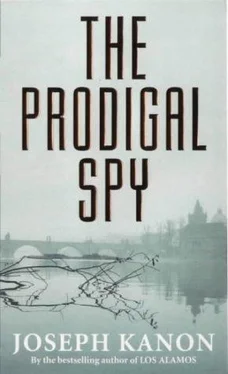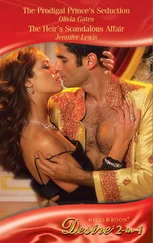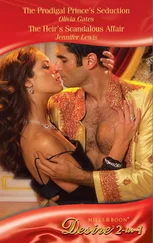I hope you die, his mother had said. But she hadn’t meant that. Nick just wanted to know, and then he could rest. It seemed to him that their lives on 2nd Street had ended without any explanation. There had to be a reason. The hearings were starting again. They were looking for more Communists. So things went on. Was that all it had been? Politics, a piece of history? The trouble with history, his father had said, is that you have to live through it. But he hadn’t meant this, half-living in a mystery. One day it will all seem like a dream. But it wouldn’t, just the same mystery. That was the dread: he would never know.
His mother ended it that spring by selling the house. They would start over in New York, where nobody cared, and Nick would go to Rhode Island, where Father Tim had arranged for a place at his old school. Tim was taking them there himself, in the big DeSoto he drove like a carriage, hands on either side of the wheel as if he were holding reins.
Nick went with him for gas while his mother finished packing-an excuse, Nick suspected, for one of Father Tim’s chats. But Tim was bubbly, as far away from homilies as a man on a picnic. They drove around the Mall, a last tour. “You’ll like the Priory,” he said. “Of course, people always say that about their schools. I suppose they’re really remembering themselves when they were young.” Nick looked over at him, unable to imagine the ruddy face over the white collar as anything but grown up. “But this time of year,” he continued, taking one hand away to gesture to the tree blossoms, “well, you won’t find a finer sight. And then you’ve got Newport down the road. All the boats. I used to love that. Hundreds of sails, all across the bay.” He stopped, aware of Nick’s silence. “You’ll like it,” he repeated. “You’ll see.”
“My father wouldn’t like it,” Nick said. “He didn’t want me to go to a Catholic school.”
Father Tim didn’t say anything to that. Nick watched him shift uncomfortably in his seat, avoiding the subject, his father’s name like a cloud over the bright day.
“Well, give it a chance,” Father Tim said. “You’ll see. But a fair chance, mind. You don’t want to be a burden to your mother. Not now. She’s had worries enough to last a lifetime. Rose isn’t as strong as she looks. It’s been a difficult time for her, you know.”
What about me? Nick wanted to say, but he was quiet. Then, “Why do you call her Rose?”
Father Tim smiled. “Well, she was Rose when I first knew her. She hated ‘Livia’ in those days. Like a Roman wife, she said. You know, Calpurnia. Names like that.” He smiled again, glad to reminisce. “She was just Rose Quinn then. The prettiest girl at Sacred Heart.”
“Maybe you should have married her,” Nick said, curious to see if his father’s joke had been right.
“Well, I married the church,” Father Tim said, but he’d misunderstood Nick and looked at him, troubled. “He’s still your father, Nick. No matter what.”
This was so far from what Nick had been thinking that he didn’t know what to say. Instead, he changed the subject. “Is it a sin to wish somebody would die? To say it, I mean.”
“Yes,” Father Tim said, “a great sin.” Then, misunderstanding again, “You don’t wish that, do you? No matter what he’s done.”
“No,” Nick said. “I don’t.” But he was disconcerted. Tim had opened a different door. What did Tim think his father had done?
They stopped for a red light and Nick looked across at the Smithsonian, surrounded by flowering trees.
“Of course you don’t,” Father Tim said. “Anyway, that’s all past now. You’ll both have a fresh start.”
But not together, Nick thought. He remembered the night his father went away, his mother clinging to Nick. He’d imagined going on like that, just the two of them. Now it seemed she’d be better on her own, putting Nick behind her with everything else. Maybe it was because he looked like his father, a visual reminder of what they were all supposed to forget.
“It’s not easy making a new life,” Father Tim said, as if they’d already disposed of the old. “But she’ll have you to help her now.”
This struck Nick as unfair, coming from the man who’d arranged to send him away, but he said nothing.
“You’ll settle in before you know it,” Father Tim went on. “And it’s just a train ride from New York. You’ll make new friends. It’ll be a fresh start for you too.”
“They’ll know,” Nick said. “At school.”
Father Tim paused, framing an answer. “It’s not Washington, Nick. They’re a little out of the world up there. That’s one of the nice things about the old Priory. They don’t hear much.”
“I don’t care anyway,” Nick said, looking out the window at the Mall. They were climbing the hill now, up toward the Capitol.
“You mustn’t mind what people say, Nick,” Father Tim said gently. “We’re not responsible for what our parents do. There’d be no end to it then. God only asks us to answer for ourselves.”
Nick said nothing, staring up at the Capitol, where everything had started. The flashbulbs and microphones. Maybe the committee was meeting now, banging gavels on the broad table, driving someone else away.
“If you commit suicide, do you go to hell?”
Father Tim glanced at him, visibly disturbed, then nodded. “Yes.”
“Always?”
“Yes, always. You know that, Nick. It’s a sin against God.”
“What if you helped? What if you made someone do it? Then what?”
“You mean that poor woman,” Father Tim said quietly. “We don’t know why she did that, Nick. You mustn’t judge. It may not have anything to do with your father.”
“No, not him. I was thinking about Mr Welles.”
Father Tim looked at him in surprise. “Mr Welles?”
“They said in the papers he was pressuring her. What if-”
“I don’t think that’s true, Nick. And even if it were, we mustn’t judge. He’s only doing what he thinks is right.”
“No. I saw him. He’s-” Nick searched for a word, but it eluded him. “Bad,” he finally said, knowing it was feeble and childish.
But his inadequacy seemed to relieve Father Tim. “Not necessarily,” he said smoothly. “I know it’s hard for you to understand. I don’t condone his methods either. But Communists are godless people, Nick. Sometimes a man does the right thing the wrong way. That doesn’t make him bad.”
Nick looked at him, stunned. Tim thought his father was godless-that’s what he’d done. We mustn’t judge. But Tim had judged and now he was going to save Nick, shipping him off to the priests and a world where people didn’t hear much. Save him from his father.
“Now this won’t do, you know,” Father Tim said, catching his look. “Taking the world on your shoulders like this. They’re still pretty young shoulders, Nick. The right and wrong of things-that’s what we spend our whole lives trying to figure out. When we grow up.” He smiled. “Of course, some people never do, or I’d be out of business, wouldn’t I?”
Nick saw that he was expected to smile back and managed a nod. There was nothing more to say, and now he was frightened again. Even Father Tim was with the others.
“What you’ve got to do now,” Father Tim said with a kind of forced cheer, “is get on with your own life. Never mind about your father and his politics and all the rest of it. That’s all over. You’ve got to look after your mother now. Right?”
Nick nodded again, pretending to agree.
“You have to let go,” Father Tim said quietly, his final point.
“He’s still my father,” Nick said stubbornly.
Father Tim sighed. “Yes, he is, Nick. And you’re right to honor him. Just as I do mine. That’s what we’re asked to do.”
Читать дальше












